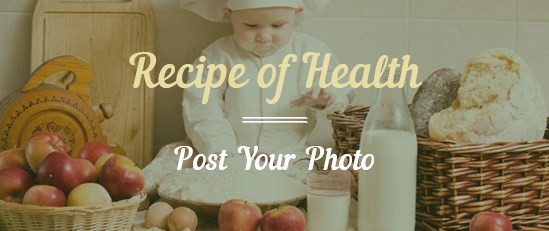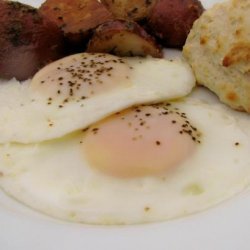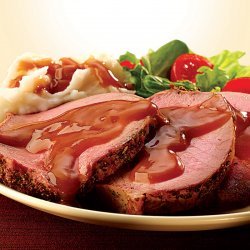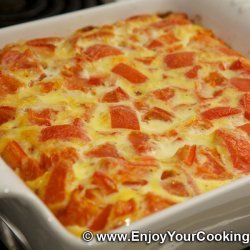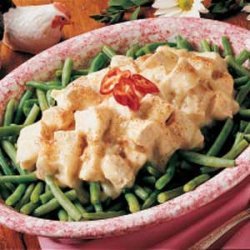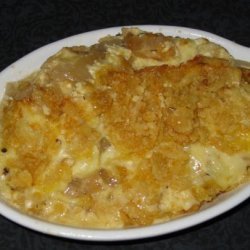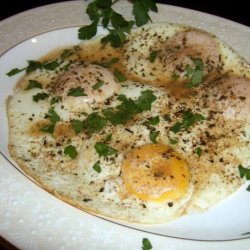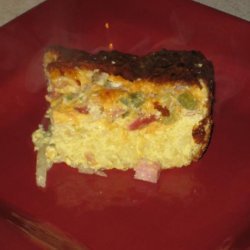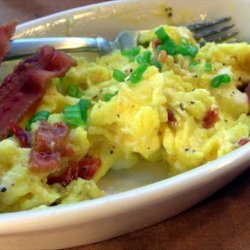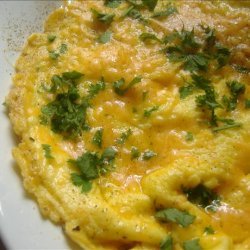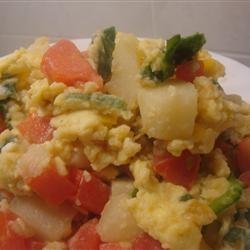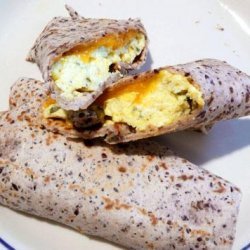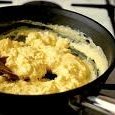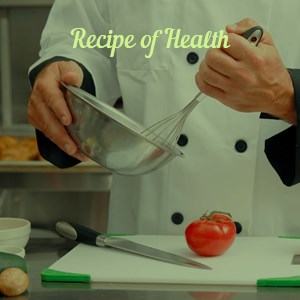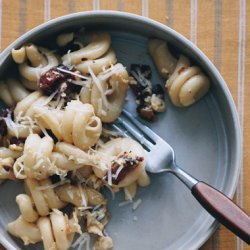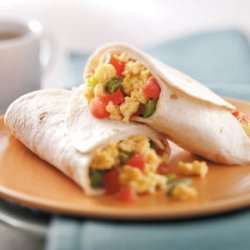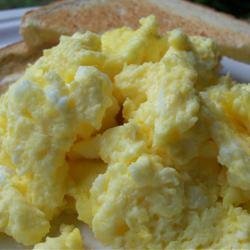Directions:
- Melt the butter in a heavy skillet or nonstick pan. Combine the eggs, salt, pepper, and 2 tablespoons water in a bowl. Briskly whisk, pour into the skillet, and turn the heat very low. Gently stir the egg mixture, lifting it up and over from the bottom as it thickens. Continue to stir until the desired texture is achieved. They thicken and dry out very quickly toward the end, so if you like them soft and moist, remove them from the heat a little before they reach the desired texture; they will continue to cook after being removed from the pan.
- Scrambled Eggs with Ham. Add 1/2 cup finely chopped cooked ham to the egg mixture.
- Scrambled Eggs with Cream Cheese. Cut 4 ounces cream cheese into small cubes and add to the eggs after they begin to thicken in the skillet.
- Scrambled Eggs with Chives. Add 1 tablespoon chopped chives and 1 tablespoon chopped parsley to the egg mixture, and substitute 2 tablespoons cream for the water.
- Scrambled Eggs with Lox. Fry 1/2 onion, sliced, and 2 slices lox in the butter before adding the eggs, and eliminate the salt from the mixture.
- Scrambled Eggs with Chicken Livers. Fry two chicken livers, diced, in the butter before adding the egg mixture.
- Scrambled Eggs with Asparagus. Add 2/3 cup crisp-cooked asparagus, in 2-inch pieces, to the eggs just after they begin to thicken in the skillet.
- Scrambled Eggs with Peppers and Onions. Fry 1/2 red pepper, diced, and 1/4 onion, chopped, in the butter for about 5 minutes before adding the egg mixture.
- Scrambled Eggs with Mushrooms. Melt the butter in a heavy skillet. Sauté 1 1/2 cups sliced mushrooms with 4 tablespoons finely chopped onion over medium-high heat for 4-5 minutes. Lower the heat before adding the egg mixture.
- Cooking Temperature No matter what the technique, it is essential to use low, gentle heat when cooking eggs: egg protein beings to thicken at only 144°F, and toughens rapidly. The only exception is omelets; there the bottom is cooked quickly over medium-high heat, but the surface remains slightly runny, making for a soft interior when folded. Serve cooked eggs on warm, not sizzling hot, plates or they will continue to cook after they are removed from the pan.
- Food Safety and Eggs There is an ever-growing concern about the threat of salmonella, bacteria that contaminate eggs, poultry, and meat. Because we often eat eggs lightly cooked and even raw (in sauces like mayonnaise, for instance), they pose a greater threat. In trying to assess the seriousness of the problem, I have consulted government agencies the Food and Drug Administration, the Agricultural Department, and the Centers for Disease Control and many other food safety experts. The findings are frustrating because there seems to be no collective information as to how many eggs are infected, and how many people have been stricken with salmonella in this country, so there is no way of knowing the degree of risk one is taking when eating raw or lightly cooked eggs, which are used in many recipes. Government officials recommend that immuno-compromised patients, the very young and the elderly, all of whom are the most severely affected when stricken, should not eat raw or lightly cooked eggs. Until the problem has been licked, the rest of us are consuming eggs that have not been cooked to 165° at our own risk. Incidentally, eggs in cakes, cookies, and breads have been sufficiently cooked to be safe.
Nutrition Facts
| Amount Per 1 Serving | |||
| Calories | 241.37 Kcal (1011 kJ) | ||
| Calories from fat | 204.1 Kcal | ||
| % Daily Value* | |||
| Total Fat | 22.68g | 35% | |
|---|---|---|---|
| Cholesterol | 313.51mg | 105% | |
| Sodium | 687.84mg | 29% | |
| Potassium | 109.84mg | 2% | |
| Total Carbs | 0.92g | 0% | |
| Sugars | 0g | 0% | |
| Dietary Fiber | 0.07g | 0% | |
| Protein | 9.75g | 20% | |
| Vitamin A | 0.2mg | 6% | |
| Iron | 1.5mg | 8% | |
| Calcium | 48.3mg | 5% | |
| Amount Per 100 g | |||
| Calories | 232.24 Kcal (972 kJ) | ||
| Calories from fat | 196.38 Kcal | ||
| % Daily Value* | |||
| Total Fat | 21.82g | 35% | |
|---|---|---|---|
| Cholesterol | 301.64mg | 105% | |
| Sodium | 661.82mg | 29% | |
| Potassium | 105.68mg | 2% | |
| Total Carbs | 0.89g | 0% | |
| Sugars | 0g | 0% | |
| Dietary Fiber | 0.07g | 0% | |
| Protein | 9.38g | 20% | |
| Vitamin A | 0.2mg | 6% | |
| Iron | 1.4mg | 8% | |
| Calcium | 46.5mg | 5% | |
* Percent Daily Values are based on a 2000 calorie diet. Your daily values may be higher or lower depending on your calorie needs.
Find out how many calories should you eat.
Get Your Recipe of Health!
Follow RecipeOfHealth on Facebook!

